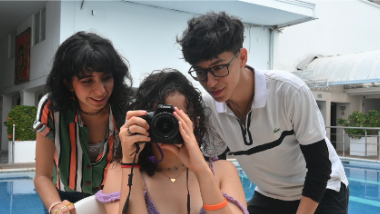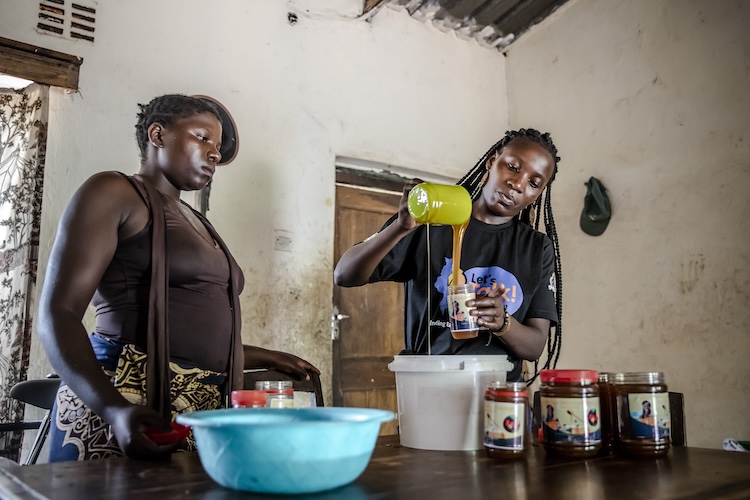Updates
Partnering for education: How Norway’s commitment to young people helps empower the most left behind
08 Apr 2024
Updates
08 Apr 2024
OSLO, Norway – Education is recognized as a fundamental human right by the international community, a hard-won victory achieved through global efforts to underscore the full potential of individuals and societies. There is no doubt about the value of education for young people or its power to transform their futures.
Yet one critical aspect is still falling through the cracks of this global achievement: Comprehensive sexuality education is missing from curricula in many countries, leaving millions of young people without the tools and skills they need to navigate crucial aspects of their lives and to make their own informed choices for their futures.
Comprehensive sexuality education programmes play a vital role in keeping young people safe and empowering them to build healthy relationships. While most are taught in schools, for more than 260 million children and young people who are not in school this lack of information can leave them more vulnerable to coercion, abuse, sexually transmitted infections and unintended pregnancy.
The Government of Norway has partnered with UNFPA, the United Nations sexual and reproductive health agency, to address the needs of the children and young people left furthest behind in education, and who are therefore less empowered when making choices about their lives, families and futures. Through a global programme spanning twelve countries across five continents and with support from Norway and Spain, UNFPA delivers locally-tailored comprehensive sexuality education interventions that address the needs in particular of refugees, LGBTQI+ youth, young people living with HIV, indigenous youth, and young people living with a disability.
Meeting the diverse needs of young people
Through 31 safe spaces in the Republic of Moldova – eight of which are designed specifically for teenagers – UNFPA’s programme provides crucial support to adolescent refugees who have fled the full-scale invasion of Ukraine. These spaces provide counselling, sexual and reproductive health referrals and information, personal development advice, menstrual hygiene products and contraceptive supplies.

In Colombia, the programme integrates comprehensive sexuality education into peace-building efforts and fosters tolerance and diversity. Trainers conduct a variety of sessions, both in person and virtually, covering topics such as sexuality, gender norms, gender-based violence, and reconciliation and advocacy on improving access to comprehensive sexuality education. Among the participants is Valeria, a psychologist from Florencia, Caquetá, in the Amazonas region, who uses photography to encourage inclusion. “I love making diverse sexuality and gender expressions visible,” she said. “With my photos, I want to invite people to be more respectful of those who express diverse sexualities.”
In Malawi, a country vulnerable to extreme weather events such as floods and droughts, the programme focuses on the links between comprehensive sexuality education and climate crises. These disasters often force young people out of their homes and into poverty, severely impacting their education and employment as well as their sexual and reproductive health. Loss of income can lead to higher rates of early marriage, while sudden and mass population displacements are known to greatly exacerbate gender-based violence.

Catherine Mkandawire is a lead facilitator on comprehensive sexuality education in the district of Nkhatabay in Malawi. She works with UNFPA to engage young people on their sexual and reproductive health through environmental conservation and climate change awareness. Every Saturday she holds ‘climate talks’ with around 40 young people, where she motivates them to seek careers that can sustain their planet as well as their own lives. These sessions are an entry point to discuss their sexual and reproductive health lives, a key enabler to adapt and grow resilient in the face of climate change. In districts like Dedza, the programme extends to activities such as tree planting, which generates income while raising awareness on contraception and family planning.
Investing in comprehensive sexuality education
Today, a quarter of women cannot make decisions about their own health care; a quarter cannot say no to sex with their partner; nearly one in 10 women are not able to make their own decisions about contraception. While progress has been made, it is clear that there is much still to be done.
UNFPA Executive Director Dr. Natalia Kanem is in Oslo for the 8th International Parliamentarians’ Conference on the Implementation of the ICPD Programme of Action, which commemorates the 30th anniversary of the Cairo Conference that placed the rights of women and girls at the centre of sustainable development. UNFPA will continue calling for increased and targeted investments in comprehensive sexuality education to equip young people with the tools to make informed decisions about their bodies and lives, and empower them as agents of change.
As we celebrate a landmark event that has changed the vision of development, it is high time this message resonates widely. Through partnerships with and investments from governments like Norway, countries can demonstrate their commitment to building a healthier future for young people and for all.